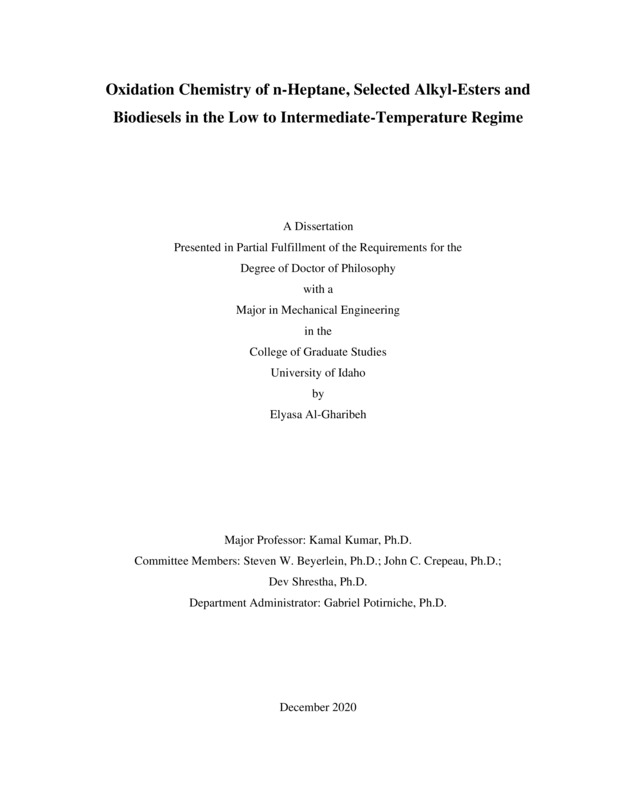Oxidation Chemistry of n-Heptane, Selected Alkyl-Esters and Biodiesels in the Low to Intermediate-Temperature Regime
Al-Gharibeh, Elyasa. (2020-12). Oxidation Chemistry of n-Heptane, Selected Alkyl-Esters and Biodiesels in the Low to Intermediate-Temperature Regime. Theses and Dissertations Collection, University of Idaho Library Digital Collections. https://www.lib.uidaho.edu/digital/etd/items/algharibeh_idaho_0089e_11962.html
- Title:
- Oxidation Chemistry of n-Heptane, Selected Alkyl-Esters and Biodiesels in the Low to Intermediate-Temperature Regime
- Author:
- Al-Gharibeh, Elyasa
- Date:
- 2020-12
- Program:
- Mechanical Engineering
- Subject Category:
- Energy; Engineering
- Abstract:
-
This work examines the low-to-intermediate temperature combustion chemistry of long-chain alkyl esters through detailed speciation and heat release analysis in a motored engine. The data include in-cylinder pressure measurements and GC-MS analysis of the reaction end products. The fuels investigated include methyl decanoate, coconut, and canola oil methyl esters. In addition, n-heptane, known for its pronounced low-temperature oxidation features, is studied to establish a general understanding of the combustion process. For each of the fuels tested, the reaction was initiated and sustained by a gradual increase of the engine compression ratio to traverse the low-to-intermediate-temperature range.
All the fuels revealed a low-temperature heat release feature. n-Heptane has the most pronounced low-temperature heat release in terms of amount and rate among the tested fuels. This was followed by methyl decanoate, coconut oil biodiesel, and canola oil biodiesel. The heat release during coconut and canola derived biodiesel combustion correlate with their saturated methyl ester content. Coconut biodiesel oxidation showed a considerable low-temperature heat release as its composition is dominated by saturated methyl esters. On the other hand, canola oil biodiesel had negligible, largely suppressed, low-temperature heat release as it consists mainly of unsaturated methyl esters. Moreover, canola biodiesel exhibited oxidation characteristics similar to unsaturated methyl esters with a centered carbon double bond.
The speciation studies identified multiple oxidation end-products in the exhaust gases of the tested fuels. The concentrations of these products correlate with the extent of the low-temperature heat release of the fuel. Sixty-four intermediate species were identified in the case of coconut and canola biodiesels. It was found that the oxidation products of biodiesel are similar to that of the saturated surrogate methyl decanoate. This suggests that the saturated methyl esters content may be primarily responsible for the low-temperature heat release. The unsaturated constituents in biodiesel, do not seem to participate and may suppress the low-temperature heat generation under the current test conditions. The present work verifies the approach of modeling the biodiesel oxidation as a combination of saturated and unsaturated simple methyl esters. Unsaturated methyl ester with a centered C = C double bond exhibit similar characteristics to canola oil biodiesel and are well suited as its surrogate fuels.
Furthermore, the combustion of four decanoic acid-derived alkyl esters, namely methyl, ethyl, propyl, and butyl decanoate, were investigated in a Fuel Ignition Tester (FIT) using global measurements, to infer the influence of carbon number variation for the alkyl moiety within the alkoxy group on the autoignition delay times. It was observed that increasing the alcohol chain length increased fuel reactivity. However, this enhancement diminishes as the carbon number exceeds a certain value, eventually leading to a negative impact on the ester reactivity.
- Description:
- doctoral, Ph.D., Mechanical Engineering -- University of Idaho - College of Graduate Studies, 2020-12
- Major Professor:
- Kumar, Kamal
- Committee:
- Beyerlein, Steven; Crepeau, John; Shrestha, Dev
- Defense Date:
- 2020-12
- Identifier:
- AlGharibeh_idaho_0089E_11962
- Type:
- Text
- Format Original:
- Format:
- application/pdf
- Rights:
- In Copyright - Educational Use Permitted. For more information, please contact University of Idaho Library Special Collections and Archives Department at libspec@uidaho.edu.
- Standardized Rights:
- http://rightsstatements.org/vocab/InC-EDU/1.0/

